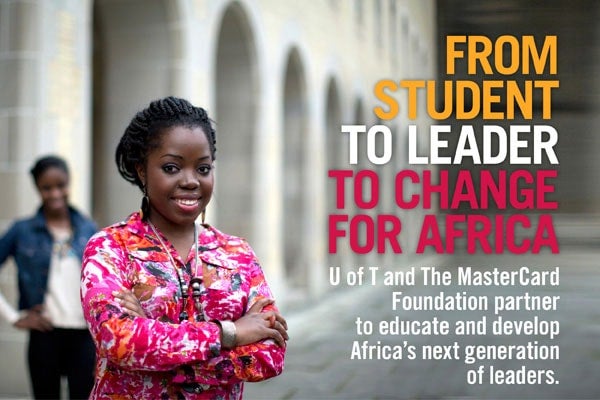
U of T and The MasterCard Foundation to develop next-generation African leaders
Published: April 18, 2013
The University of Toronto will join The MasterCard Foundation Scholars Program, with a USD 22.5 million grant announced April 18 by The MasterCard Foundation.
The grant is part of a $75 million announcement, which brings three Canadian institutions into The MasterCard Foundation Scholars Program – a global education initiative to educate and develop next-generation African leaders who will contribute to social transformation across the continent.
It is one of the largest foundation grants in Canadian history.
U of T is one of the Program’s 15 university and secondary education partners from around the world. The announcement included funding for U of T, University of British Columbia, and McGill University, as the only Canadian partners in the Program’s network of institutions. The partners were selected based on their academic excellence, nurturing environments, and programs relevant to economic growth sectors in Africa.
“The MasterCard Foundation Scholars Program will develop next-generation leaders who will have a transformational impact in developing countries,” said Reeta Roy, President and CEO of The MasterCard Foundation. “McGill University, University of British Columbia, and University of Toronto bring tremendous expertise to our vision. The diversity and excellence of their institutions will offer Scholars an extraordinary opportunity for learning and exchange of knowledge.”
U of T President David Naylor expressed his appreciation for the partnership with The MasterCard Foundation.
“We’ve all seen Asia blossom on the world stage. Now, as the visionaries at The MasterCard Foundation have seen, it’s Africa’s turn,” said Naylor. “That’s why I am so pleased that the University of Toronto will be participating in The MasterCard Foundation Scholars Program.”
“The Program will help us recruit some of the best and brightest students from Africa. They will join over 430 students from 31 countries in Africa currently studying at U of T. And these young leaders will not only play a part in the ongoing rise of Africa. They will be bridge-builders between that continent and Canada.”
The MasterCard Foundation Scholars Program is a $500 million global education initiative that will provide secondary and university education to an estimated 15,000 young people in developing nations, primarily in Africa.
In total, the three Canadian institutions will partner with The MasterCard Foundation to educate and develop 270 young Scholars from Africa, and prepare them to return to the continent and lead change in their communities. The Program selects bright, motivated young people from economically disadvantaged communities, who, despite facing challenges, have demonstrated leadership and a commitment to improving the lives of others.
In total, 67 students – all undergraduates – will come to U of T over the next five years, to study Arts and Science or Engineering at the St. George campus. The Program provides a comprehensive set of supports, which includes tuition, residence, meals, and travel. In addition, the students will receive a comprehensive set of wrap-around supports - special orientations, student and faculty mentors, internships through a network of employers in Africa, cohort-based activities, a senior faculty advisor, as well as all the services normally available to U of T students - to enable successful transitions into their education in Canada, and ultimately into the workforce in Africa.
Scholars at U of T will also be engaged in opportunities for community service throughout their education, which will reinforce ethical leadership and a commitment to the betterment of their home countries.
For more information about The MasterCard Foundation Scholars Program at the University of Toronto go to www.utoronto.ca/mcfscholars.
To learn more about The MasterCard Foundation Scholars Program, visit www.mastercardfdnscholars.org
About The MasterCard Foundation
The MasterCard Foundation is an independent, global organization based in Toronto, Canada, with more than $6 billion in assets. Through collaboration with partner organizations in 49 countries, it is creating opportunities for all people to learn and prosper. The Foundation’s programs promote financial inclusion and advance youth learning, mostly in Africa. Established in 2006 through the generosity of MasterCard Worldwide when it became a public company, the Foundation is separate and independent from the company. Its policies, operations, and funding decisions are determined by its own Foundation Board of Directors and President and CEO. To learn more about the Foundation, please visit www.mastercardfdn.org.
About U of T and Africa
African Students and Alumni
As of fall 2012, there are 433 African students studying at the University of Toronto. That number includes 357 undergraduate and 76 graduate students from 31 countries in Africa. Six hundred and thirty-three U of T alumni are currently living in 34 African countries, with the largest concentrations in South Africa, Kenya, Egypt, and Niger.
Select Partnership Highlights
• University of Nairobi (Kenya)
The nearly decade-long relationship between the faculties of medicine at U of T and of U of N has spanned the areas of research, education and joint publications. The Faculty of Medicine at U of T, in partnership with its counterpart at U of N, has formalized this relationship through an MOU signed in 2013 which covers: exchange of faculty, research staff, technicians and students; joint research projects; exchange of information and academic publications; and, promotion of educational activities for research, personnel technicians and students.
• University of Namibia
U of T has been sending students to U of Namibia since 1997 to advance our mutual understanding of the multidimensional impact of HIV/AIDS in Namibia and beyond. Students from a wide range of disciplines at U of T have been participating in this program, including African Studies, Gender and Equity Studies, Public Health, Pharmaceutical Science, and Kinesiology and Physical Education. The program covers: joint research activities (including student and faculty exchange); exchange of academic materials; and, participation in seminars and academic meetings.
• University of Addis Ababa (Ethiopia)
The Ethiopian Canadian Nursing Collaboration: The Collaboration is a joint initiative with Addis Ababa University Department of Nursing and Midwifery (AAUCSN) and the Lawrence S. Bloomberg Faculty of Nursing. The overall aim is to strengthen the nursing profession and health system in Ethiopia. This partnership includes a total of six teaching trips, 2010-2013, as well as ongoing thesis support on site and by distance. As this first research-focused phase ends this year, the clinical education phase is set to begin.
TAAPP: In 2003 the Department of Psychiatry at the University of Toronto was invited to partner with the Department of Psychiatry at Addis Ababa University to form an educational collaboration called The Toronto Addis Ababa Psychiatry Project (TAAPP). The objectives of TAAPP are to assist the development of educational capacity and sustainability for Ethiopian psychiatry, and promote the ongoing development of mental health services in the country.
TAAAC: The mandate of the Toronto Addis Ababa Academic Collaboration (TAAAC), formed in 2008, is to develop a critical mass of academics and health professionals trained in Ethiopia. In February 2013, Ethiopia’s first-ever class of family medicine residents started training with help, in part, from the Department of Family and Community Medicine (DFCM) at the University of Toronto. The Ethiopian family medicine residents will address a constellation of medical problems significantly different from the patterns seen by their peers in Canada. For example, they will treat more infectious diseases, such as TB, malaria, and HIV.
• MOI University School of Medicine (Eldoret, Kenya)
AMPATH: The University of Toronto’s involvement in the Academic Model Providing Access To Healthcare (AMPATH) involves both reproductive health and public health and is located at Moi University School of Medicine and Moi Teaching Referral Hospital. Both U of T’s Faculty of Medicine and the Dalla Lana School of Public Health are consortium members.



